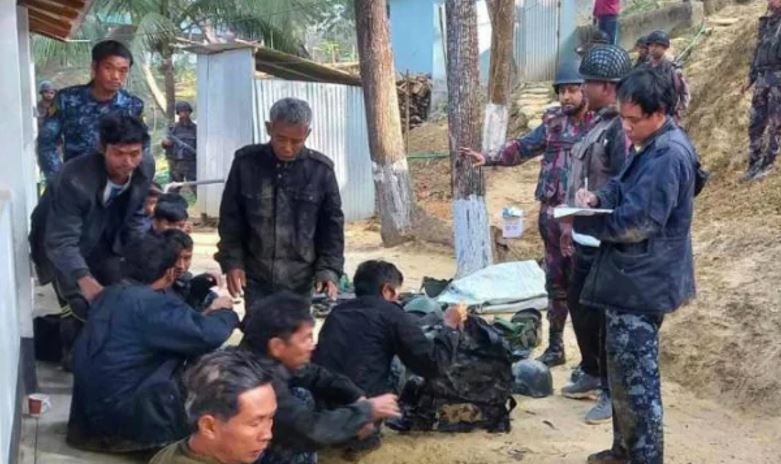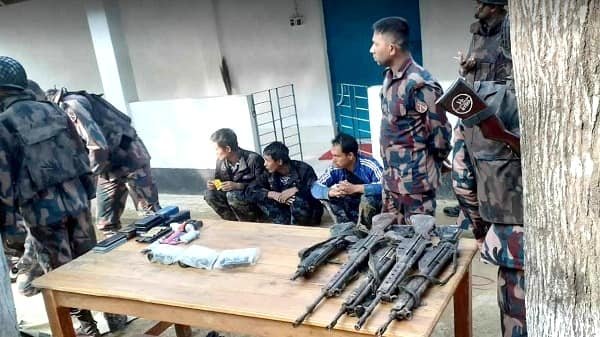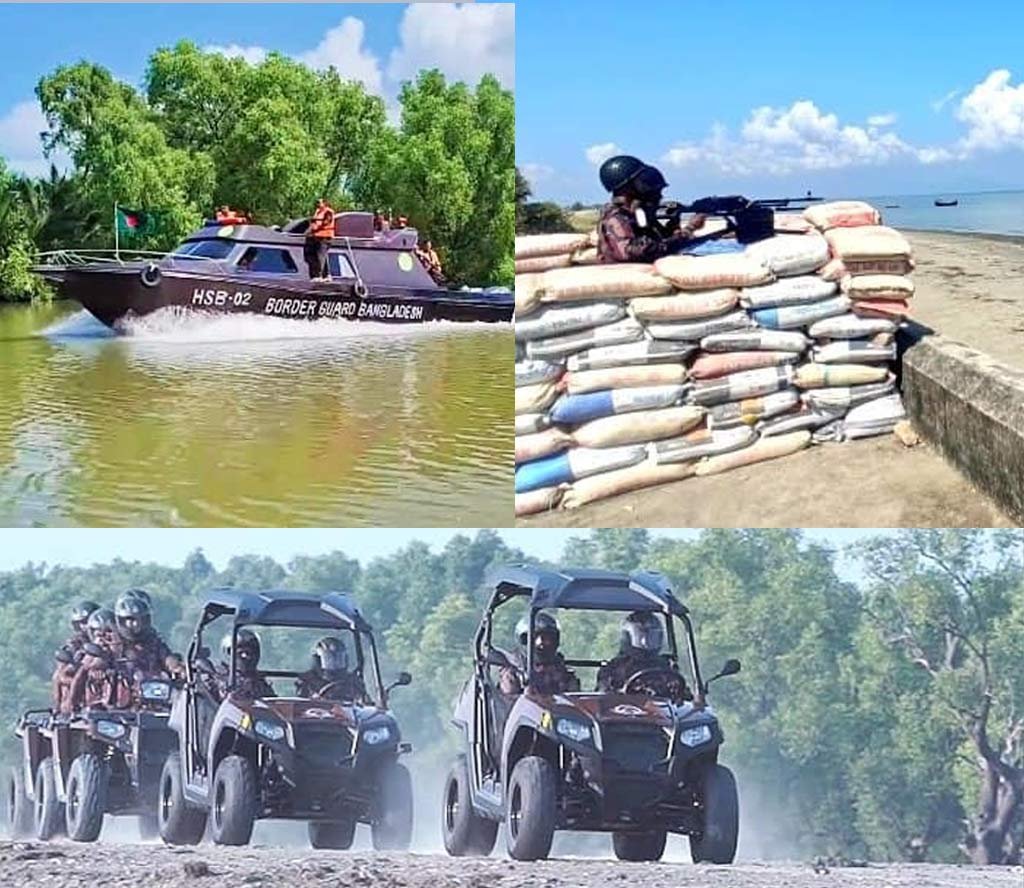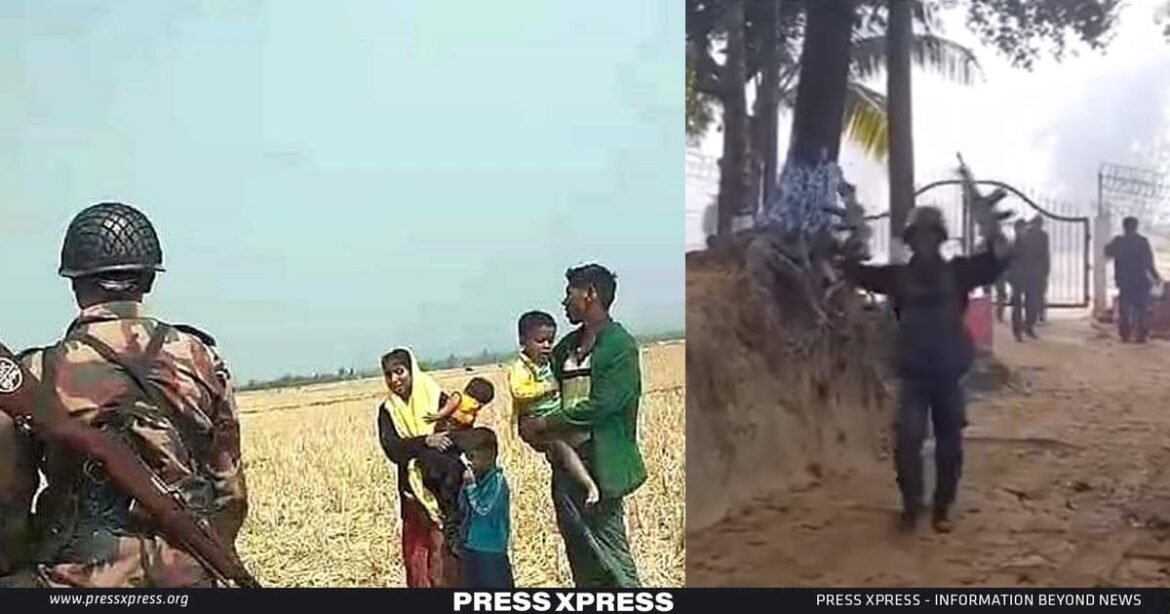Bangladesh neighboring country Myanmar is at crossroad as the country now brewing in intense civil war and the united ethnic rebel groups gaining ground, making a severe blow to junta’s iron fist grip of power.
The intensity of the war bordering Rakhine state brings the conflict uncomfortably close to Bangladeshi residents. Military helicopters patrolling near the border and frequent bullets, mortar shellslanded inside Bangladesh, further escalating fear of splitting the war into Bangladesh.
At least two people were killed and a child was injured after a mortar shell from Myanmar, fell on the Ghumdum border in Bandarban on Monday (February 5). Bordering Bangladeshi residents now deserting their home in fear of falling prey to the indiscriminate bullets coming from Myanmar. At least five schools and a madrasah were kept shut again to ward off any untoward incidents.

According to the public relations department of Border Guard Bangladesh-34 and its headquarters, a fierce battle between the Arakan Army and the junta government is being fought on the other side of the border since Sunday. Bangladesh Border Guard (BGB) said that more than 50 mortar shells landed near border pillars 47 and 48 in the last previous days.
Myanmar Border Guards Take Refuge
As of Tuesday noon, a total of 264 members of Myanmar’s border and security forces have come to Bangladesh to escape the fighting between the Myanmar army and the rebel Arakan Army at the border between the two countries, according to the Border Guard Bangladesh (BGB).
Newly appointed BGB Director General Major General Mohammad Ashrafuzzaman Siddiqui said a total of 115 crossed the border till last night.
“In the morning, 114 more came,” he said in the capital this afternoon. “By the afternoon, 35 more joined them and the total now stands at 264.

The shelter seekers include members of immigration, Myanmar police and other agencies, said Shariful Islam, public relations officer (PRO) of Border Guard Bangladesh (BGB), adding that the BGB members disarmed them and took them to a safe shelter.
BGB disarmed them and gave them shelter, Md Shariful Islam said.
The BGP has been embroiled in heavy fighting with the Arakan Army, an armed insurgent force, for the past few days in Myanmar near Tumbru in Bandarban’sNaikhongchhari.
Many of them injured. They are undergoing treatment in different hospitals in Cox’s Bazar district, the BGB official added.
The BGP personnel will be sent back to Myanmar, Home Minister Asaduzzaman Khan said on Sunday. The government has already spoken with Myanmar on the issue.

“We do not know how long this war in Myanmar will last,” AsaduzzamanKhan said. “But we will not allow anyone else to cross the border and enter Bangladesh.”
‘We Don’t Want War but We Are Ready’
Foreign Minister Hasan Mahmud on Tuesday said that It is unexpected and unacceptable that the the Myanmar conflicts are spilling over into Bangladesh and that is also leading to the deaths and injuries of Bangladeshis. Bangladesh foreign ministry made this communication to Myanmar envoy U Aung Kyaw Moe, who was summoned by the ministry on Tuesday.
“We have issued a strong protest against the incidents on the Myanmar-Bangladesh border,” Hasan Mahmud told reporters at the ministry.
Home Minister Asaduzzaman Khan said, “We do not want to get involved in any war, but Bangladesh is ready to face any crisis.”
Bangladesh is increasing strength while the police and Coast Guard have been instructed to resist any intrusion through the borders, he added.
The minister also said that the Arakan Army is taking control over more bases of Myanmar military forces in Rakhine state. They also captured the spots along the Bangladesh border. Junta forces are using helicopters to battle the AA, RSO and the copters allegedly violate Bangladesh’s air space.
Bangladesh foreign ministry has continued discussion with Myanmar while the BGB has remained alert at the border, said the home minister.
Meanwhile, Bangladesh Border Guard (BGB) Director General AKM Nazmul Hasan has asked BGB personnel to remain alert along the border areas to face any untoward incidents. Bangladesh has a 271-kilometer sea and land border with Myanmar. The country is now bearing the brunt of more than 1.3 million Rohingya refugees who are in Teknaf and Ukhia.

Bangladesh Must Act Carefully
Bangladesh must act carefully to prevent any sorts of involvement in the war, therefore make all efforts for a peaceful solution to the problem. Earlier, Bangladesh summoned Myanmar’s ambassador several times but the efforts went in vain as the military junta don’t and didn’t adhere to international rules and agreement. Bangladesh must boost its efforts to internationalize the issue to find a sustainable solution.
Professor Imtiaz Ahmed, of Dhaka University’s International Relations Department, said, “If Bangladesh adopts a mixed strategy of demonstration of military power and diplomacy simultaneously, the Myanmar military can’t respond easily. Thus Bangladesh needs to pursue a peaceful diplomatic approach towards Myanmar.”
The ongoing conflicts in Rakhine and Chin, bordering Bangladesh, bring economic, humanitarian, and security challenges. Escalating junta-rebel fights risk violating borders, impacting refugees. Myanmar’s “Four Cuts” strategy, seen in 2017, caused Rohingya exodus to Bangladesh. The fear now is Rakhine might face a similar fate. The worst-case scenario involves prolonged war, facilitating drug and weapon smuggling, already troubling Bangladesh. The Myanmar crisis poses a grave threat to Bangladesh’s well-being.
The Myanmar civil war poses challenges for India and China too, complicating regional dynamics. The Three Brotherhood Alliance’s control of Shan State and key trade routes has significant geopolitical implications. Incidents like a mortar shell hitting China on January 4 highlight the direct impact on neighboring nations.
In India, tensions between the Meitei and Kuki communities in Manipur stem from Kuki migration from Myanmar. This has fueled historical tensions, contributing to ongoing strife with 175 lives lost by September 2023.
The spill-over effects on Bangladesh and neighboring countries are concerning. China’s attempts at a ceasefire face hurdles due to the questionable trustworthiness of Myanmar’s junta. Recognizing the junta’s incapacity and advocating for their stepping down is crucial for the majority’s desire for democratic restoration in Myanmar.
Will Rohingyas be Benefitted from Rebel’s Triumph?
On Wednesday (January 31), Myanmar’s National Unity Government (NUG) said it wants to repatriate the Rohingyas with full citizenship and other rights after toppling the military junta that took control of the country through a coup in 2021.
“The people of Myanmar, the revolutionary groups including the ethnic communities are more united than ever today. We will form a federal democracy,” said Kyaw Zaw, spokesperson and adviser to the president of NUG.
Kyaw Zaw of the NUG, a parallel government formed by the leaders of the National League of Democracy following the military coup in 2021, said the military over the decades never wanted any genuine repatriation of the Rohingyas.
“As we return to power, we will amend all the discriminatory laws, including 1982 Citizenship Law of Myanmar, to ensure justice and rights of all Myanmar people irrespective of ethnicity and religion,” Zaw said.
Asked on the differences in stances of various ethnic groups, he said the NUG will hold dialogues with all the ethnic and other groups and form the federal democracy in Myanmar. But experts expressed caution as there are multiple players in the process.
“There is a lack of interest among the conflicting parties about repatriation, which is not a priority for them right now. Among them is the Arakan Army, which will be an important factor in the repatriation question in the future,” says Shahab Enam Khan, professor of international relations at Jahangirnagar University.
The professor mentions that Myanmar’s National Unity Government, the government in exile formed by the lawmakers and politicians ousted in the 2021 coup, has started to recognize that Rohingyas are a part of Myanmar. He says the recognition is encouraging.
Life as a Waiting Game
Bangladesh faces heightened challenges in sheltering Rohingyas as international contributions to refugees are reduced by a third. Monthly food allocations for each Rohingya dropped from $12 to $8 due to decreased aid. In refugee camps, life is marked by prolonged uncertainty as Rohingyas hope for a safe return amidst complex Myanmar politics, especially after the coup and current turmoil. Initially anticipating a swift return, they now grapple with enduring camp conditions for an extended period.
However, the harsh reality now confronts them as they grapple with the prospect of enduring camp conditions for an extended period, potentially spanning years or even decades. Parents grapple with the fear that their children might become part of a lost generation, deprived of formal education opportunities. Illicit economic activities burgeon among refugees facing financial pressures but lacking the right to formal employment. While international accountability remains imperative for sustainable peace, the daily urgency faced by displaced Rohingya families, as well as those still residing in Myanmar, demands immediate and focused action.


